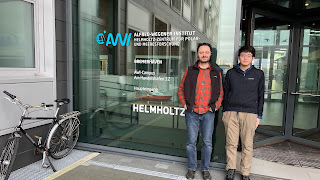Dear, everyone, this is Keito Aonuma.
Last year, I spent three months (late October to mid-February) at the Alfred Wegener Institute for Polar and Marine Research (AWI) in Bremerhaven, Germany. AWI is a renowned institution known for its cutting-edge scientific research in polar regions and its comprehensive environmental studies in the North Sea.
During my first month, I focused on studying oceanography, ocean physics, and the ecosystem. The North Sea's characteristics differ significantly from the oceans surrounding Japan, providing me with a foundational understanding of its unique marine system. For example, the North Sea is a wide, shallow ocean, leading to extensive tidal synchronization. Additionally, I reviewed the characteristics of various biological phyla in detail for my internship work. The differences in ecosystem structures between the North Sea and Japanese waters result in the presence of different species. Although I must refrain from mentioning specific prevalent species due to ongoing research, this month allowed me to gain a deep understanding of the organisms inhabiting the North Sea.
This preparatory period was necessary not only for studying but also, unfortunately, for managing procedures related to residential permits in Germany.
In late November, my experiment began. I joined a research team analyzing the benthic ecosystem of the German Bight, a region of the North Sea. My main task was to extract organisms (unfortunately deceased due to formalin) from sediment samples. Throughout the experiment, I classified these organisms, which deepened my understanding of the North Sea ecosystem. Although examining samples under a stereo microscope was quite tiring, it provided me with valuable experience. This experience strongly motivated me to further my research on benthic organisms and other marine systems.
A better understanding of ecosystems, especially benthic ecosystems, is crucial for comprehending the carbon cycle in which these ecosystems are involved. Benthic organisms, closely associated with sediments, play a key role in the material cycle between soil and water.
I would like to thank Dr. Yokoyama, my host Dr. Jan Beermann, and all the people who helped me during my stay abroad.
Christmas Market of Bremen. The Old City Hall is registered as a World Heritage.
------------
I was abroad from August last year until the latter half of April this year, receiving various forms of support during my stay. Below are links to reports detailing my experiences in the different locations I visited:
------------





